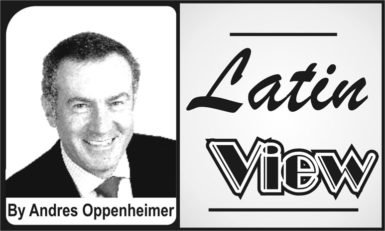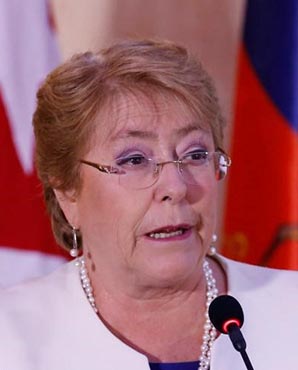Outgoing Chilean President Michelle Bachelet’s visit to Cuba last week was a disgrace to her legacy as a democratic leader. But what’s worse, it was a huge blow to the remnants of a democratic, human rights-conscious and globalized left in Latin America.
 For decades, Chile’s moderate leftist governments have been a model for Latin America’s democratic left. Moderate left-of-centre politicians across the region cited Chile as an example of a country that succeeded in reducing poverty on a long-term basis without the political repression, economic chaos and massive migration caused by the radical leftist regimes of Cuba and Venezuela.
For decades, Chile’s moderate leftist governments have been a model for Latin America’s democratic left. Moderate left-of-centre politicians across the region cited Chile as an example of a country that succeeded in reducing poverty on a long-term basis without the political repression, economic chaos and massive migration caused by the radical leftist regimes of Cuba and Venezuela.
Chile has reduced poverty from 40 percent of its population at the end of Gen. Augusto Pinochet’s dictatorship in 1990 to 11.7 percent of the population in 2015, a larger drop than in any other Latin American country.
And much of the credit for Chile’s success is due to the moderate leftist presidents who ruled the country in the post-Pinochet era. They signed free-trade agreements with dozens of countries, maintained good relations with the business community and upheld democratic values at home and abroad.
Even Bachelet’s first term in office, from 2006 to 2010, was marked by pragmatism and good economic policies. But during her second term, which started in 2014, she reverted to some old-guard leftist education and economic measures that have not worked anywhere. Former right-of-centre president Sebastian Piñera won the Dec. 17 elections and will take office in March.
Why did Bachelet go to Cuba, in one of her last international appearances before leaving office? And why did she meet with the last military dictator of the Americas, Gen. Raúl Castro, without seeing any member of Cuba’s peaceful opposition during her trip?
The Bachelet government’s claim that the trip was aimed at improving Chilean-Cuban business ties sounds like a joke. According to the EFE news agency, bilateral trade between Chile and Cuba is less than $40 million a year, which in today’s world amounts to nothing.
If Bachelet’s purpose was to increase Chilean exports, she would have made better use of her time going to a country with a growing economy. Cuba is bankrupt. The lights on the island would have gone off if it weren’t for Venezuela’s oil subsidies.
Patricio Navia, a New York University professor and well-known Chilean political analyst, told me that Bachelet’s visit was most likely a “nostalgic trip.”
“She went there to close a chapter of her personal history, from the days of her youth when she was a supporter of the Cuban Revolution,” Navia said. “It’s like if, after 30 years of marriage, you go to the place where you met your first girlfriend when you were 15.”
There is also a possibility that, as some Chilean insiders tell me, Bachelet may have gone to Cuba on a secret mission to ask Castro to talk with Venezuelan President Nicolás Maduro to try to convince him to accept a negotiated solution to Venezuela’s crisis.
The foreign ministers of Mexico and Chile are currently mediating ongoing talks between Venezuela’s opposition and the Maduro regime. But the talks have failed so far, because of Maduro’s refusal to allow free and fair elections.
Bachelet may have made a last-minute trip to seek Castro’s help before a new round of talks scheduled for Jan. 12. But, if so, why didn’t Chile say so?
Most likely, Bachelet’s visit was a symbolic act to establish her leftist credentials before starting a post-presidential career in Chile or at an international organization abroad.
Sadly, it is also a symbolic setback for the region’s democratic left. The leftist label has been left in the hands of the autocrats of Cuba, Venezuela, Bolivia and Nicaragua, and the former populist leaders of Argentina, Brazil and Ecuador, whose governments were marked by massive corruption.
It’s a real pity, because Latin America would be much better off with democratic leftist and rightist parties competing in free elections and ensuring stability. Bachelet’s shameful trip to Cuba has only left Latin America’s democratic left more bereft than ever of a highly visible role model.










